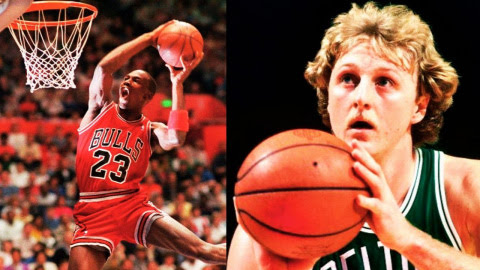Lookback at the moment when Celtics legend Larry Bird asserted dominance over a young Michael Jordan during an exhibition game between the Olympic-bound men’s basketball squad.
Back in 1984, Larry Bird was already a seasoned NBA champion with the Boston Celtics, dominating the courts. Meanwhile, Michael Jordan was making headlines on college courts at UNC Chapel Hill.
Zooming in on a moment that’s been tucked away in history, Larry Bird faced off against a young Michael Jordan and showed his dominance during an exhibition game between the Olympic-bound collegiate squad and NBA giants.
Little did Bird know, that seemingly inconspicuous encounter would set the stage for the rise of an undisputed NBA legend.
What’s the tea?
In a clip posted by The Universe Galaxy NBA on September 24, 2023, former Sports Illustrated senior writer, Curry Kirkpatrick shared a story about a moment when NBA legend Larry Bird asserted his dominance over a young Michael Jordan.
Kirkpatrick recounted a 1984 exhibition game between the Olympic-bound men’s basketball squad, primarily comprised of collegiate players, and a team of NBA superstars led by Bird, Magic Johnson, Isaiah Thomas, and Bill Walton.
The incident occurred during warm-ups when a ball from the collegiate side bounced over to the NBA players.
According to Kirkpatrick:
“Early in the warmups, and the ball bounced down from the college end of the floor to the pro end. Then Michael Jordan went down to chase it. The ball had to be picked up by Larry Bird. And Michael went up a few feet away and held out his hands, and Bird took the ball and fired it back down the court over Jordan’s head as if to say, ‘You’re not only not getting this ball, I don’t give a damn who you are.’”
Despite this initial setback, Michael Jordan went on to have an illustrious career, playing 15 seasons in the NBA from 1984 to 2003 and winning six NBA championships with the Chicago Bulls.
Michael Jordan’s iconic career in retrospect
The Chicago Bulls made a smart move by choosing Michael Jordan as their third overall pick in the 1984 NBA draft. During his first season in 1984-1985, Jordan showed his incredible skills by scoring an average of 28.2 points per game. He played a crucial role in transforming the Bulls into a team that could compete in the playoffs. As a result, he was rightfully awarded the title of NBA Rookie of the Year.
The following season (1985–1986) faced a setback as Jordan’s second year was cut short due to a foot injury. However, he made a return for the playoffs, notably scoring a playoff career-high of 63 points against the Boston Celtics, even though the Bulls ultimately faced a loss.
In the 1986–1987 season, Jordan scored 3,000 points in a single season. Despite this achievement, Magic Johnson claimed the MVP, and the Bulls were swept by the Celtics in the playoffs.
The period from 1987 to 1990 presented challenges for Jordan and the Bulls, particularly from the physically dominant Detroit Pistons during the 1987–88 season playoffs, resulting in a five-game loss in the Eastern Conference Semifinals.
However, Jordan’s legacy reached new heights during the First Three-Peat from 1991 to 1993. He returned to lead the Bulls to three consecutive NBA championships, winning NBA Finals MVP each time. The Bulls’ dominance culminated in a notable 72–10 record in the 1995–96 season
His return to the NBA in 1995 marked another iconic chapter, leading the Bulls to two more NBA championships in 1996 and 1997. Memorable moments during this period include the legendary “Flu Game” and a remarkable shot over Bryon Russell.
Jordan’s career took another turn with a second retirement in 1999, but he re-entered the basketball scene as part owner and president of basketball operations for the Washington Wizards in 2000.
In 2001, Jordan returned as a player for the Wizards, playing two more seasons before retiring for the final time in 2003.
The culmination of Jordan’s illustrious career came in 2003, his final season with the Wizards.
Celtics Pride: Larry Bird’s leadership transformed Boston into NBA title contenders
Moving on to Larry Bird’s profile, he was selected by the Boston Celtics as the sixth overall pick in the 1978 NBA draft. Instead of immediately joining the Celtics, Bird completed his final college season at Indiana State, leading them to the NCAA title game.
Negotiations with the Celtics were challenging, but Bird eventually signed a five-year, $3.25 million contract on June 8, 1979.
Bird made an immediate impact in his rookie season (1979–80), transforming the Celtics into title contenders. He led the team to an improvement in the win total and was named Rookie of the Year, despite the Celtics being eliminated in the Conference finals.
The following seasons saw the Celtics bolstering their roster, and with Bird’s leadership, they won the 1981 NBA Championship, defeating the Houston Rockets in six games.
From 1983 to 1986, Bird achieved a three-peat as the NBA Most Valuable Player, leading the Celtics to multiple playoff appearances. Despite facing back injuries, Bird and the Celtics had an outstanding 1985–86 season, winning 67 games and securing another NBA Championship.
Persistent back problems eventually led to Bird’s retirement on August 18, 1992, and the Celtics promptly retired his jersey number 33 in recognition of his extraordinary contributions.
